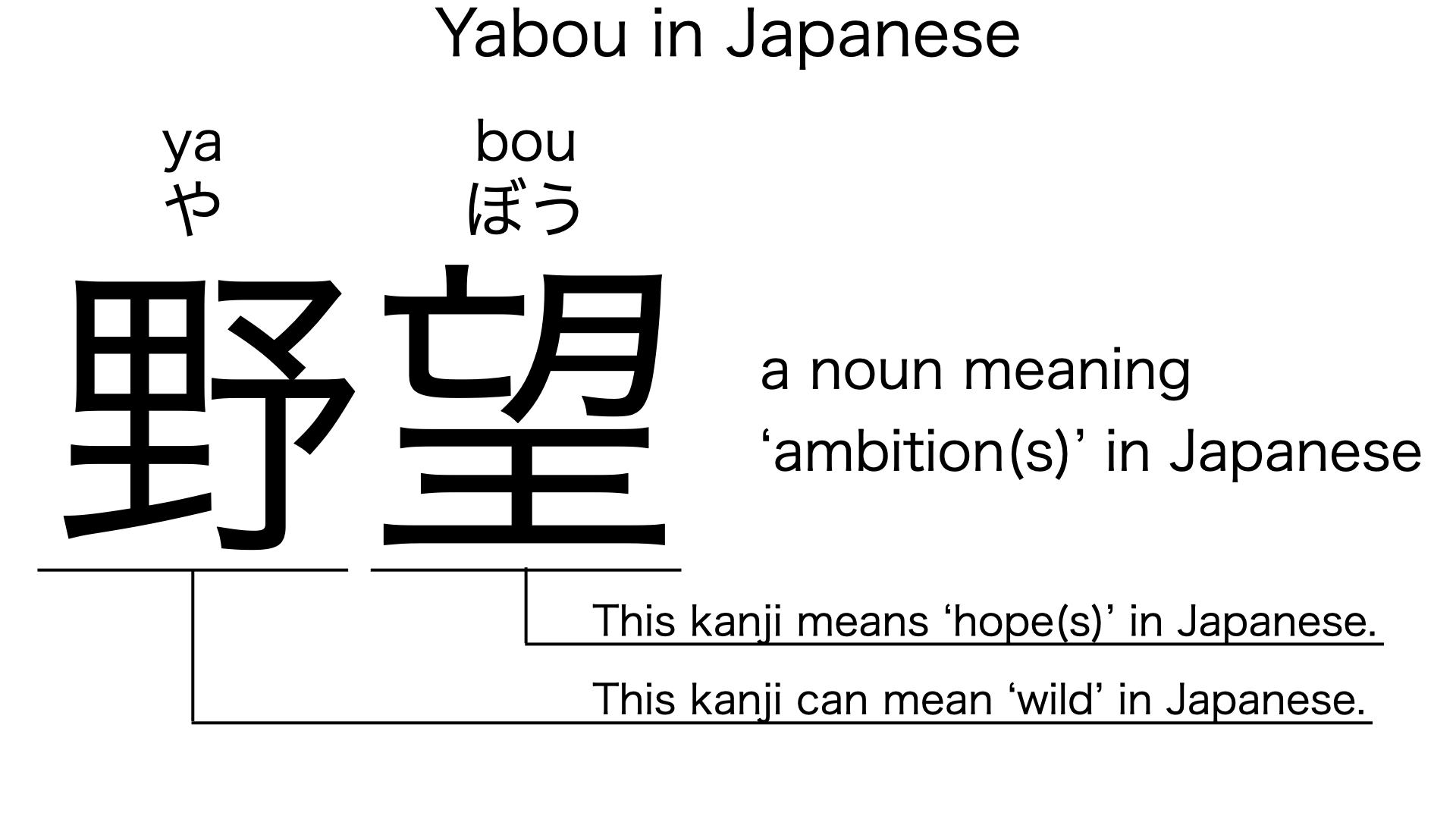What does “yabou” mean in Japanese?
Native speakers say “yabou” to mean ‘ambition’ in Japanese. Perhaps, some Japanese learners know this word as it is sometimes used in Japanese movies, video games, novels, manga, anime, and the like. In this blog post, however, I will explain this word in detail based on its kanji expression. And also, I will explain how to use it through example sentences. My explanations would help Japanese learners understand “yabou” more clearly. Then, let’s get started!
Contents
Definition and meaning of “yabou”
Let me start with the definition and meaning of “yabou”.
- yabou – 野望 (やぼう) : a noun meaning ‘ambition’ in Japanese. This can also work as plural. Learn more about Japanese plural.
The definition and meaning are simple and clear. To understand this noun more clearly, however, let me explain its kanji characters in detail, one by one.
What does “yabou” literally mean in Japanese?
The kanji expression of “yabou” consists of the following two kanji characters:
- 野 : a kanji character occasionally used to mean ‘wild’ in Japanese.
- 望 : a kanji character widely used to mean ‘hope’ in Japanese.
From these two kanji characters, we can understand that the formed noun literally means ‘wild hopes’ in Japanese. This literal interpretation is not completely in line with the actual meaning, but still understandable, I think. Ambitions can often be considered as wild hopes.

When we meet new kanji expressions, we should check their kanji characters in detail to understand their meanings clearly and deeply. In many cases, kanji characters tell us a lot about the meanings of the expressions they form. Actually, here, we could get the better understanding of “yabou” through the detailed kanji check above.
So far, I’ve explained the definition and meaning of “yabou” together with its kanji characters. Then, let me explain how to use it through the example sentences below.
Example #1: how to say “ambition” in Japanese
boku no yabou wa sensei ni naru koto desu – 僕の野望は先生になることです (ぼくのやぼうはせんせいになることです)
My ambition is to become a teacher.
Below are the new words used in the example sentence.
- boku – 僕 (ぼく) : a pronoun meaning ‘I’ in Japanese. This is used mainly by boys and young males.
- no – の : a case particle used after a noun or pronoun to make its possessive case. In the example, this is used after “boku” to make its possessive case, “boku no”, which means ‘my’ in Japanese.
- wa – は : a binding particle working as a case marker or topic marker. In the example, this works after “boku no yabou” to make the subject in the sentence.
- sensei – 先生 (せんせい) : a noun meaning ‘teacher’ in Japanese. This can also work as plural.
- ni – に : a case particle used to say what someone or something becomes. In the example, this is used after “sensei” to say what the speaker wants to become.
- naru – なる : a verb meaning ‘to become’ or such in Japanese.
- koto – こと : a noun but often used as a noun clause marker. In the example, this is used after “sensei ni naru” to make the noun clause in the sentence which means ‘to become a teacher’ in Japanese.
- desu – です : an auxiliary verb used after a noun or adjective to make it polite. In the example, this is used after “sensei ni naru koto” to make it sound polite.
This is a typical usage of “yabou”. In this example, it works together with the possessive case, “boku no”, to mean ‘my ambition’ in Japanese.
Example #2: another usage of “yabou”
sore ga kare no yabou desu – それが彼の野望です (それがかれのやぼうです)
That is his ambition.
Below are the new words used in the example sentence.
- sore – それ : a pronoun used to refer to something not close to the speaker. In the example, this is used to say “that” in Japanese.
- ga – が : a case particle used to make the subject word or the object word in a sentence. In the example, this is used after “sore” to make the subject in the sentence.
- kare – 彼 (かれ) : a pronoun meaning ‘he’ in Japanese. In the example, this is used together with the case particle, “no”, to mean ‘his’ in Japanese.
This is another typical usage of “yabou”. In this example, it works as a part of the object, “kare no yabou”, which means ‘his ambition’ in Japanese.
Summary
In this blog post, I’ve explained the definition and meaning of “yabou” in detail based on its kanji expression. And also, I’ve explained how to use it through the example sentences. Let me summarize them as follows.
- yabou – 野望 (やぼう) : a noun meaning ‘ambition’ in Japanese. This can also work as plural. These two kanji characters literally mean ‘wild hopes’ in Japanese. This literal interpretation is not completely in line with the actual meaning, but still understandable, I think. Ambitions can often be considered as wild hopes.
Hope my explanations are understandable and helpful for Japanese learners.
Leave a Reply